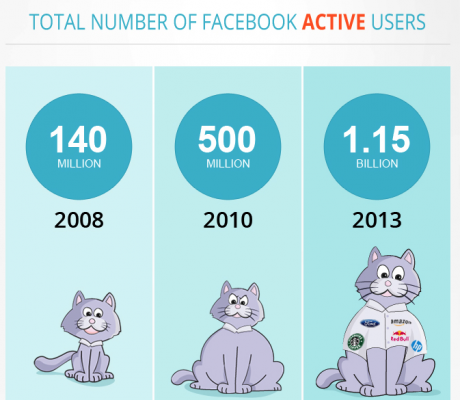Face(book) Value

Five years ago, who would have predicted that 140 million Facebook users would grow to an inconceivable 1.15 billion? Katerina Kardamaki @LimeTreeOnline breaks the story down...
Early Facebook was the adorable kitten everyone liked. Then the cat turned fat and complacent – largely because of selling out to ads.
Facebook outperformed MySpace in 2008 to become the king of social media. Twitter and other fast-growing platforms have yet to shake off the "second place" tag. Similarly to many revered companies, Facebook’s success story was written by taking calculated risks and pursuing radical innovations.
A milestone year for the company was 2010 when the ‘Like’ button was introduced. It gave millions of people a gauge of social approval. Another key ingredient has been Facebook’s unique user experience across different platforms. It is estimated that 751 million users accessed their account via mobile in 2013 as opposed to 24 million in 2010 – a huge increase.
The Ages
Delving into demographics, we notice an important shift in the average user age. Today’s teenagers and under 25s are less Facebook obsessed in comparison with the same age group in 2008. This is due to a range of factors: from the awkwardness of befriending your aunt to the more serious problem of online bullying and trolling.
Facebook & Companies
When it comes to business and corporate use the numbers speak volumes. As of May 2013, 16 million Facebook business pages have been created. However, in 2012, the percentage of Fortune 500 companies using Twitter was slightly higher than the Facebook equivalent. Despite that digital divide, surveys conducted on companies of all sizes reveals that a Facebook page is the last word in social media management.
Use by Continent
Alongside the US, South America and Australia account for a large portion of the global Facebook distribution. On a country level, Brazil, Indonesia and Mexico are key.
In Europe, we start noticing the "boredom factor". UK, France, and Spain (countries where Facebook has a large following) have recorded a decline in monthly visits over the past year. People who want to sign in have already done it. Although not yet alarming, the same decline is evident in the US.
Where Do We Go From Here?
It isn’t fair to expect constant, major advances from a company. Organisations, just like the individuals that compose them, need time to pause and reflect – even in the frenzied world of digital.
Facebook has not exactly paused; the company’s strategic plans include targeting the neglected continent of Africa. Growth in the African market extends even to rural areas, where mobile phone accessibility has steadily been increasing.
Let’s see what future holds for Mr Zuckerberg’s darling.
Image courtesy of Katerina Kardamaki @LimeTreeOnline.
| Attachment | Size |
|---|---|
| facebook-infographicedit.png | 1.14 MB |

